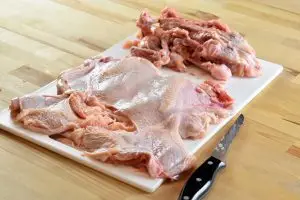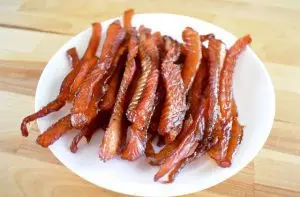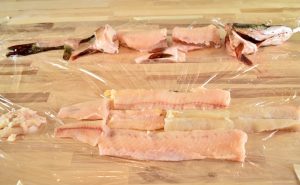 Follow this guide to break down a northern pike into several boneless fillets, as well as meaty leftovers perfect for making fish stock, soups, stews, chowders, or broth!
Check out these pike recipes if you’re looking for something fun to do with your filleted pike:
Follow this guide to break down a northern pike into several boneless fillets, as well as meaty leftovers perfect for making fish stock, soups, stews, chowders, or broth!
Check out these pike recipes if you’re looking for something fun to do with your filleted pike:
How to Break Down a Northern Pike – No Bones
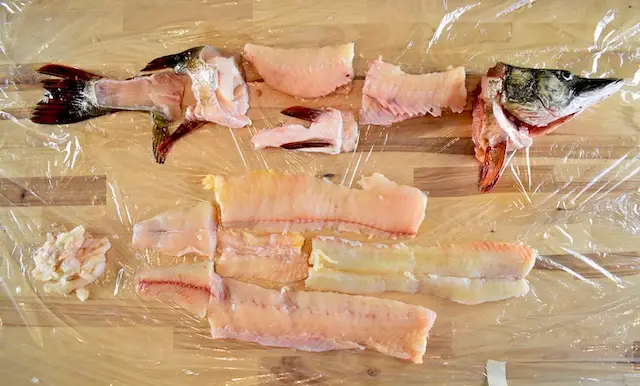
Even though many consider pike to be a trash fish, the truth is they are very tasty with mild, firm, white fillets. Using this guide, you will end up with beautiful boneless, skinless pike fillets, with no ‘Y’ bones, as well as the rest of the cleaned fish, which can be used for stock and/or soups.
A word of warning: Many provinces and states have fish eating guides which will tell you how much fish you can eat from certain lakes. Be sure to read these guides. Toxins found in lakes often accumulate in heads, bellies and organs of fish. If you are sensitive to these toxins, immuno-compromised, pregnant, etc., stick to the main fillets and avoid the other parts of the fish.
- Equipment Needed
- sharp filet knife
- shears (optional)
- cutting board
- 1 northern pike, 4+lbs
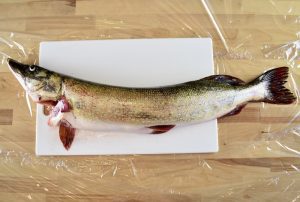
Start with a freshly caught northern pike, preferably over 4lbs (2kg) or 24″ (60cm). This fish was hovering around 6lbs.
It’s a good idea to bleed the fish when you catch it by cutting through the gills while the fish is sitting in the water (so the blood doesn’t coagulate and stop flowing). This will result in cleaner tasting fillets.
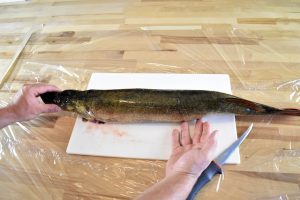
Start by setting the fish down on its belly with your non-dominant hand holding the head.
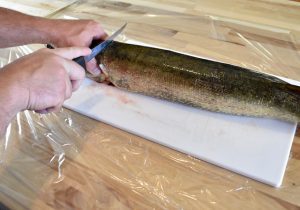
Make an incision just behind the head, where you can’t feel any bones. You’ll have to saw through a couple scales to do this.
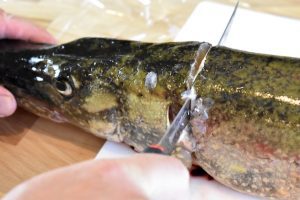
Saw down until you feel resistance from the back bone, which will stop your blade.
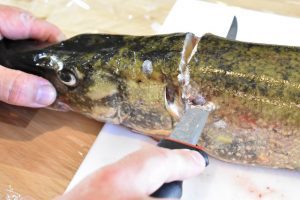
Turn your blade horizontal, away from the head, and begin slicing towards the tail, with the flat of the blade running along the back bone the entire way.
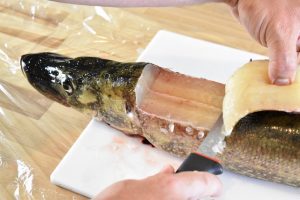
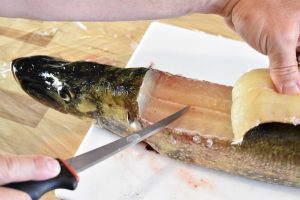
Here you can see the backbone, which you should keep your blade on. It will feel hard and bumpy.
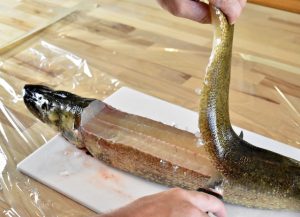
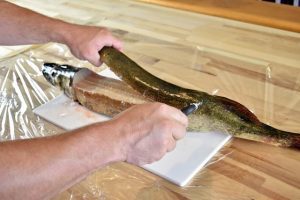
Keep cutting until you reach the dorsal fin. You will find that the blade naturally wants to lift up towards the top. Let it do so and allow the blade to come out just before the fin, leaving you with one long top fillet.
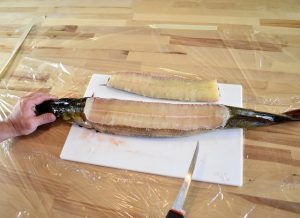
Set the fillet aside as you continue to the next cut.
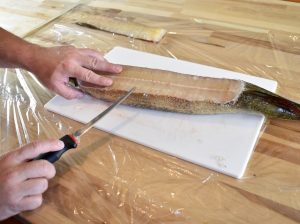
Next up is the side fillet. Looking at the top of the fish, find the two rows of small bones that run parallel to the main backbone.
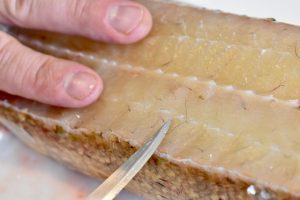
These are the ‘Y’ bones, those notoriously pesky small bones that scare so many people off of pike. Let’s cut around them.
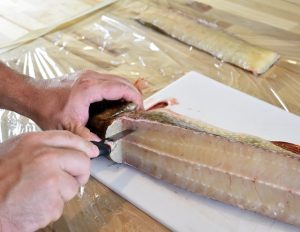
Turn the fish onto its side and insert the blade horizontally on the outside of the row of ‘Y’ bones (the skin side).
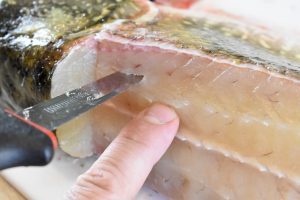
Poke the tip of the blade through to the other side and begin sawing with smooth, even movements towards the tail, always keeping above the bones.
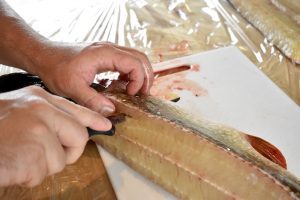
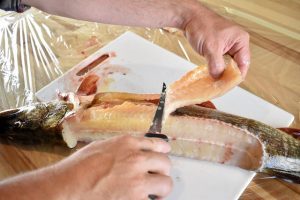
You can slice through where you made the initial cut to release the fillet if that makes it easier.
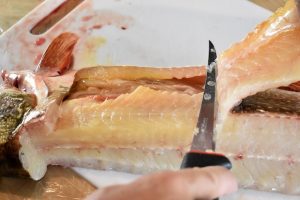
You can see that the guts are tucked away safely from your knife strokes in this position.
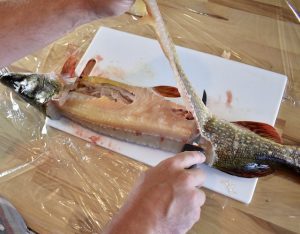
Keep cutting until you reach the point where you ended your top fillet cut. Angling the blade upwards and holding the fillet with your off-hand, make the final few slices to release the fillet.
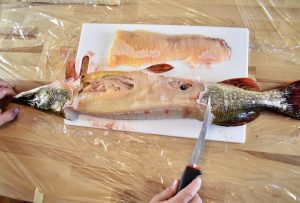
I find that this fillet is the most difficult and often isn’t quite as clean cut as the rest. Don’t worry if yours is a little mangled, you have another opportunity on the other side!
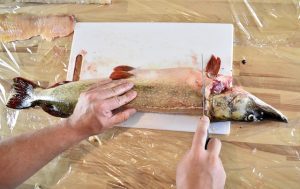
Flip the fish over. This time, make your first incision from the shoulder to the pectoral fins. You will be including the belly in this fillet.
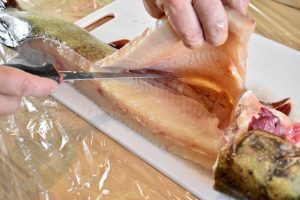
Find the row of ‘Y’ bones again and run your knife horizontally over them like you did on the other side.
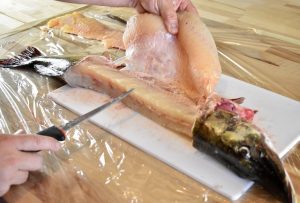
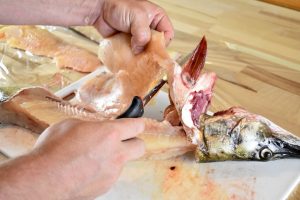
Keep slicing until you reach the same point as you did on the other side and remove the fillet, making any necessary small nicks or snips to remove the entire piece.
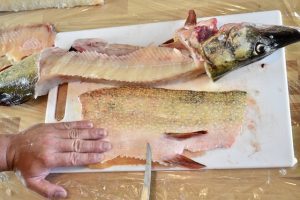
Now you have a side fillet with the belly and pelvic fins still attached.
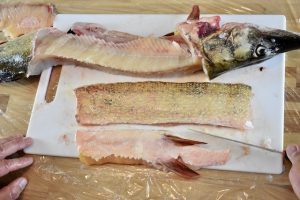
Slice off the belly piece by running your knife along the line where the colour changes from speckles to white. Set all of the fillets aside while you do the next ones off of the tail.
You can either take two more small fillets off of the tail, or cut the entire tail off behind the anus and cook it as a roast.
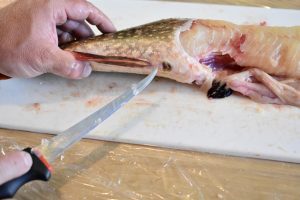
To do the fillets, start by locating the anus, just in front of the anal fin.
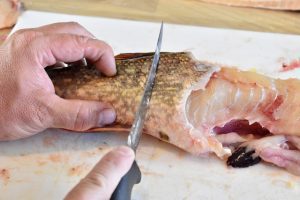
Make an incision beside the anus, leaving about an inch (2cm) of space from your side filet exit to the new incision. Slice down until you feel resistance from bone.
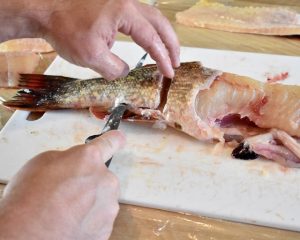
Turn your knife horizontal and follow the hard bone all the way to the tail.
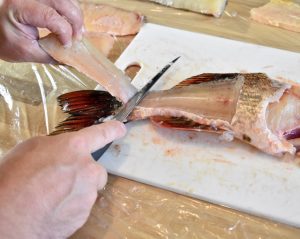
Keep slicing until the fillet is freed from the tail end. Set aside.
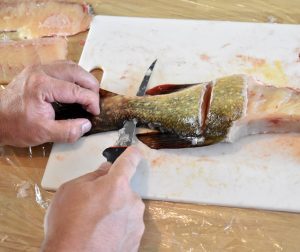
Flip the fish over and do the same thing on the other side.
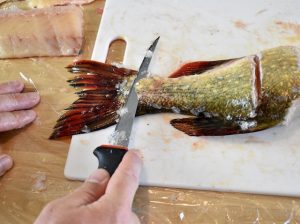
Slice through and free the fillet from the tail, then set the fillets aside.
Now it’s time to deal with the guts. Have a bowl or receptacle ready for them.
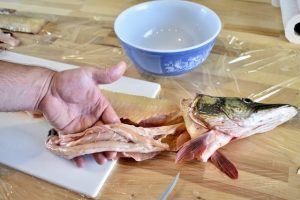
Gently grab the gut bundle with your hands and pull to separate from the fish.
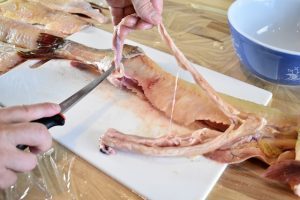
Cut the guts free from the tail side.
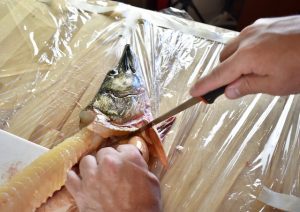
Now pull the guts away from the head side and cut them free.
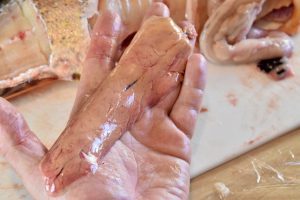
This is the pike liver. It is edible, though you want to be sure that it came from a very clean lake and you don’t want to eat many of these things as they can accumulate heavy metals. Use your best judgement and don’t eat them too often. I’m tossing this one with the gut pile.
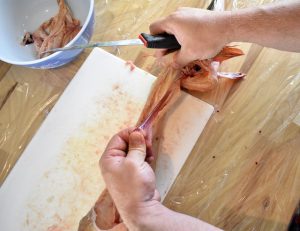
Pull out any other easy to get guts that may still be clinging on. Don’t worry about the leathery white swim bladder for now.
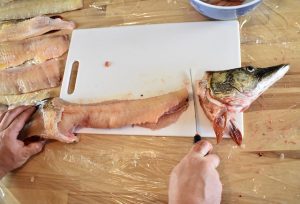
Cut the main skeleton away from the head by pressing your knife firmly through the backbone. You may want to grab a heavier knife for this depending on the size of your fish.
Now for the head.
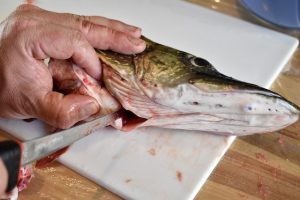
Follow the two pectoral fins towards the mouth, finding the narrow piece connecting them, resembling a throat. Cut right through it where it connects with the base of the mouth.
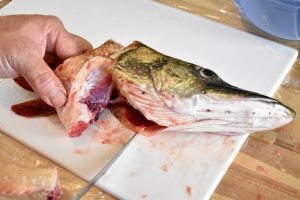
Pull back the collar, revealing the gills.
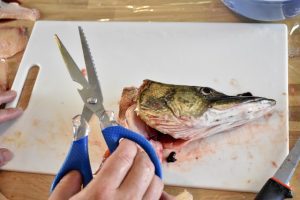
This is where some good kitchen shears come in handy, though you could use your knife too. The gills can be very abrasive, so you may want to where gloves if you have sensitive skin.
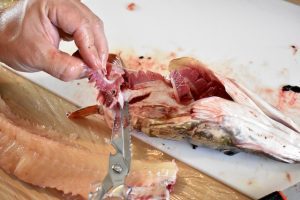
Snip out all of the gills. The blood in the gills will spoil any broth you make with the head by imparting a very bitter flavour, so you want to remove all traces of them.
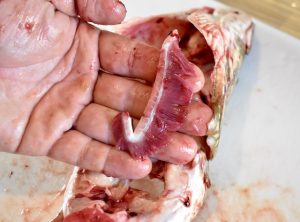
Dispose of the gills along with the gut pile.
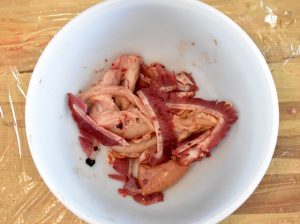
Back to the skeleton.
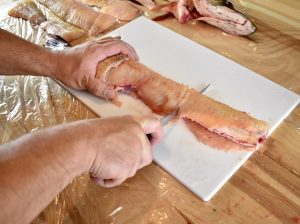
Cut through the backbone about halfway to the tail.
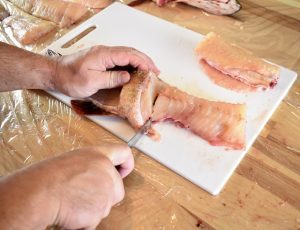
Make another cut at the tail.
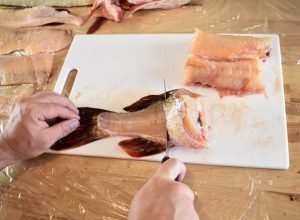
Make a third cut where you started the tail filet, right behind the skin portion.
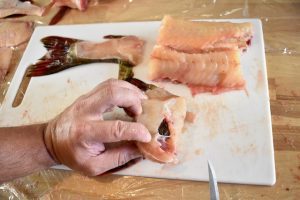
You’ll notice some reddish-black guts in the chunk between the backbone and tail.
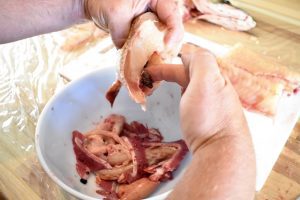
Use your finger to scrape out any guts, then rinse out the cavity with cold water.
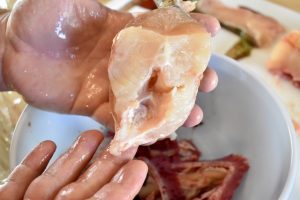
All clean!
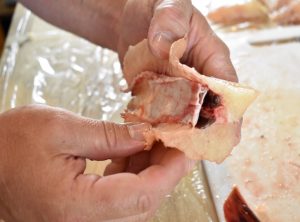
You’ll notice the same gunk in the backbone pieces, under the leathery white swim bladder.
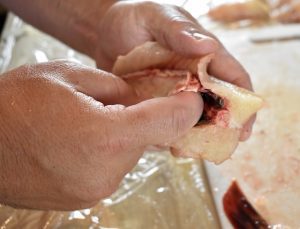
Poke your finger between the back bone and swim bladder and tear it off.
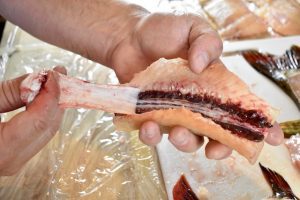
Like so.
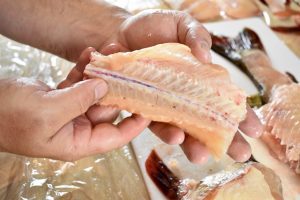
Scape out the gunk into the gut pile and give it a rinse.
Now to skin the fillets.
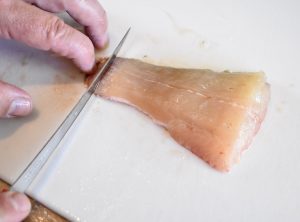
Starting with one of the tail fillets, press down on the very tip with the fingers of your off-hand. Cut down to the skin (not through it!).
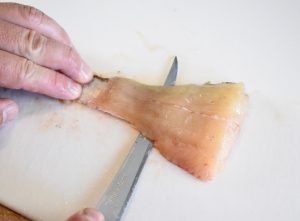
Turn the blade horizontally and begin running it along the top side of the skin, sawing with even strokes, until you pop out of the other side.
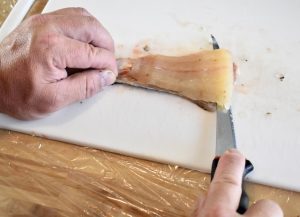
You should now have a piece of skin, and a skinless fillet. You can trim off the little handhold of flesh you used on the narrow end and add it to a scraps pile if you like.
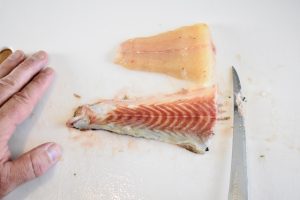
Throw the skin into the gut pile and move on to the other tail fillet and the side fillets, giving them the same treatment.
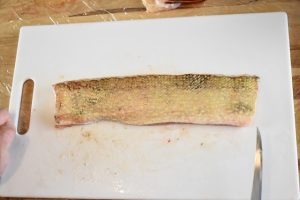
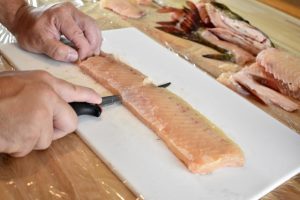
When you get to the belly fillet, remove the fins before skinning.
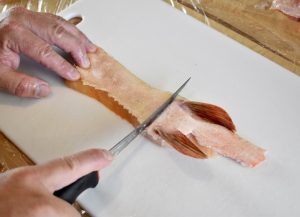
Add the fins to the soup bones pile, then skin the belly. I like to slice it from top to bottom, creating two narrow belly fillets which can be threaded onto skewers accordion-style and grilled.
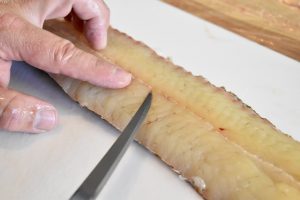
When you get to the top fillet, you’re going to want to remove the little line of bones running down the middle.
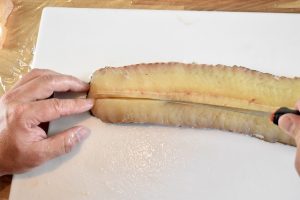
Make a notch cut on either side of the bones by running the blade on an angle down both sides of the bone line.
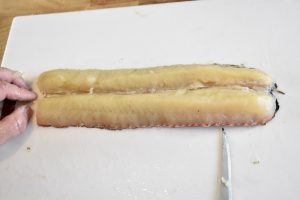
Pull out the bone line (it may come out in pieces) and add it to the soup bone pile. Now go ahead and skin the fillet.
You’ve now broken down an entire pike, good job!
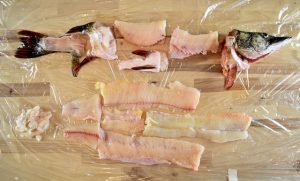
If you’d like, you can go around the bones and skins and snip off any little trimmings available. You can poach or sauté the trimmings and mix them into rice or pasta, or turn them into a salad with mayo.
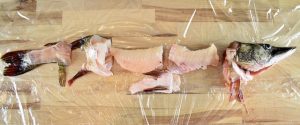
The bones can be kept for making broth, as mentioned. The head and collar in particular are great for this due to the amount of cartilage, which transforms to lip-smacking gelatine in the broth. The cheeks and nodes of meat on the back of the head are also choice morsels. I like to freeze the bones in batches, as everything from one fish is quite a bit at once.
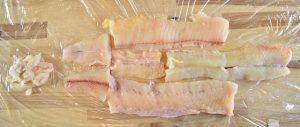
All of the fillets are now boneless, so you can cook them as you would any white fish fillet. Pike tends to hold itself together quite well, so it can be seared, poached, sautéed, broiled, or grilled. Butter-poached pike is particularly tasty.
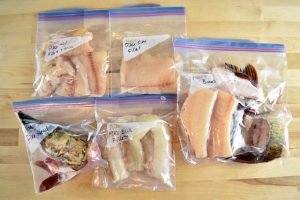
Separate the pike into zip-lock or vacuum-sealed bags, being sure to add as much or as little to each bag as you’d want to have for one meal. Transfer to the deep freezer, where you can store it for up to a year. The sooner you use it, the better it will be though, so don’t wait too long!
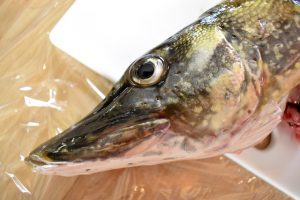
Enjoy your pike!


